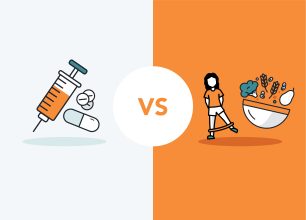TL; DR Generic weight loss advice minimizes the many struggles patients face when trying to lose weight. Instead, healthcare providers can do more to help by offering proactive, specific, and continuous engagement with their patients through a digital weight loss program.
To overcome barriers to employing such a program, practices can enlist the services of non-clinical staff or even a full-service program like the one offered by Prescribe FIT.
Lack of time leads to generic advice
Although providers consider the health of their patients a top priority, many face difficulties implementing a more integrated approach to care that promotes good health beyond the office.
Constraints such as lack of time and resources mean providers often can’t give their patients the continued one-on-one support that they need to make sustainable improvements to their health, including for weight loss.
All these factors limit providers to offering generic advice to their overweight and obese patients such as, “lose weight,” “exercise more,” and/or “eat better.” This usually doesn’t involve a follow-up appointment or continued communication, either.
While patients may try to lose weight at the recommendation of their doctor, without added guidance, this typically does not produce meaningful outcomes that lead to better health. But why doesn’t generic weight loss advice work?
Four reasons why generic advice to lose weight often doesn’t help patients drop pounds.
- Weight loss isn’t that simple
Although the advice may seem simple, eating better and moving more goes beyond a 3-week fad diet or exercise program. In reality, making these changes requires a significant amount of time and dedication to gradual intensive lifestyle changes to achieve sustainable results.
2. Patients struggle to commit
Unsurprisingly, it can be difficult for patients to commit to this journey alone, but support from trustworthy professionals can make a critical difference. Several studies identify an association between ongoing patient-provider contact and increased engagement with weight loss.
3. Lack of evidence-based interventions
Although clinical support can help patients lose weight and improve their health, this type of intervention often isn’t available to them. Why? Part of the reason is that many practices simply don’t have the time, resources, or staff to implement an intensive weight loss program for their patients.
4. Patients aren’t empowered
To complicate matters further, many patients don’t pursue professional medical help to aid them with weight loss even if their doctor recommended it. One survey found that, while over half of patients were recommended by their provider to lose weight, only about 10% of them sought help from a health professional to do so.
The solution to helping patients lose weight
The above factors create a perfect storm in which patients need more than generic weight loss advice to make meaningful improvements to their health, but providers are prohibited by resource constraints, and patients simply aren’t empowered to seek their services in the first place. So, what is the solution?
Fortunately, there are several ways to close the gap between provider advice and patient outcomes that produce meaningful results without any added burden on the practice. Two primary methods include digital health interventions and patient outreach.
Digital health interventions are often characterized by:
- Safe, sustainable improvements to eating habits.
- Accountability mechanisms such as self-monitoring of weight, exercise, and diet.
- Continued counseling sessions and follow-ups.
These evidence-based programs are shown to successfully help overweight and obese patients lose as much or more weight than in-person weight loss interventions, and significantly more weight than self-managed methods. Longer interventions have also been shown to produce greater weight loss.
The impact of patient outreach on digital health interventions for weight loss
Research highlights that providers can empower their patients to join an intervention program and produce more meaningful gains towards a healthier weight if they offer proactive, specific, and ongoing outreach.
For example, a study in the Journal of General Internal Medicine found that obese patients lost significantly more weight on average when doctors offered counseling and regular check-ins that encouraged engagement in a comprehensive weight loss intervention, rather than simply offering generic advice to “lose weight.”
How can providers implement a digital health intervention to support their patients on their weight loss journey without adding more to their already busy schedules?
One way is to partner with an organization that can serve as an extension of their practice by supplying digital support and outreach. For example, One study found that a combination of population health management and an online program resulted in more weight loss than an online-only program.
Not only can practices seek support from non-clinical staff, but they can even employ a fully comprehensive program such as the one offered by Prescribe FIT. As a full-service remote patient monitoring solution, Prescribe FIT works with orthopedic practices to extend healthcare beyond the office. We offer an evidence-based lifestyle program and one-on-one patient coaching from certified medical assistant Care Coordinators to address the root cause of orthopedic patients’ MSK issues.
Published on September 28, 2022

